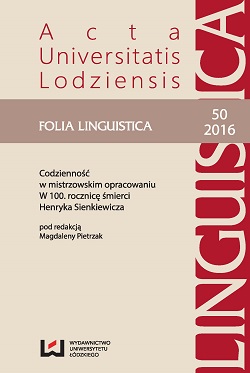Konceptualizacja mowy i języka w Trylogii Henryka Sienkiewicza
Conceptualization of speech and language in the Trilogy of Henryk Sienkiewicz
Author(s): Dorota SzagunSubject(s): Polish Literature
Published by: Wydawnictwo Uniwersytetu Łódzkiego
Keywords: language; conceptualization; speech; Sienkiewicz; nobility; Trilogy;
Summary/Abstract: This article concerns the conceptualization of speech and language in Sienkiewicz’s Trilogy. Certain methods of conceptualizing speech, language or words are timeless, they represent a durable in terms of culture, mental tissue of language. In the novel by Sienkiewicz, the conceptualization of speech and language reflects the typical for Sarmatian mentality skills and noble duties: fighting efficiency and the oratory ability. Especially strongly and permanently rooted in the Polish language is the metaphor of a dispute as war, and within it the language as a weapon, especially sword. The proper thinking in the nobility era is especially clearly reflected by the metonymic statement: prisoner–language, reflecting utilitarianism of war, and a series of farm metaphors and comparisons, such as milling with a tongue or turning the tongue as the axis of the carriage wheels. References of this type are readable even today, however they do not have now this contemporary freshness and immediacy of references, but rather seem anachronistic in the modern urban world. Durable in everyday language today is the phraseology binding language and speaking with emotion, expressing itself for example in such collocations as: bite your tongue or forget one’s tongue. Typical of nobility is also, embodied especially in the character of Onufry Zagłoba, positive valorization of noble multispeech, as a testimony of eloquence and erudition.
Journal: Acta Universitatis Lodziensis. Folia Linguistica
- Issue Year: 2016
- Issue No: 50
- Page Range: 61-73
- Page Count: 13
- Language: Polish

